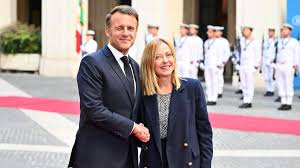
Introduction
The political landscape of Europe is continually evolving, and the interactions between key leaders significantly shape the continent’s future. In recent months, French President Emmanuel Macron and Italian Prime Minister Giorgia Meloni have become central figures in discussions about migration, economic instability, and regional cooperation. The relationship between these two leaders is crucial, not only for their respective countries but also for the broader European Union amidst emerging challenges.
Recent Developments
During a recent summit held in Paris, Macron and Meloni addressed the contentious issue of migration, which has become a pressing concern for both nations. Italy has faced increased immigration pressure as many migrants cross the Mediterranean in search of safety and opportunity, while France has also peeked into rising numbers. Both leaders acknowledged the necessity for a unified European approach to manage the migration crisis effectively.
However, their discussions revealed underlying tensions. Meloni, who represents the far-right Brothers of Italy party, has adopted a stricter stance on immigration, advocating for policies favoring border control and national sovereignty. In contrast, Macron has often called for a balanced approach that emphasizes humanitarian responsibility and shared European solidarity. The divergence in their policies highlights the ideological differences that characterize EU politics today.
Economic Collaboration and Challenges
The economic landscape poses further complexity in the Macron-Meloni dynamic. Italy is grappling with post-pandemic recovery and economic stagnation, while France continues to navigate the repercussions of inflation and energy crises. In their meeting, both leaders discussed enhancing bilateral trade and investing in renewable energy sectors, recognizing the mutual benefits that could arise from cooperation in these areas.
Despite these collaborative efforts, skepticism remains. Italy’s current political climate, with a growing populist sentiment, increasingly questions the European Union’s financial framework. Meloni’s government has been vocal about reforming how funds are distributed within the EU, pushing for more equitable solutions that resonate with her constituents.
Conclusion
The relationship between Macron and Meloni is emblematic of broader trends within European politics, showcasing the tension between cooperation and nationalism. As both leaders navigate their domestic challenges and the persistent demand for unified European action, their interactions will continue to shape policy decisions across the continent. Observers anticipate that their decisions on immigration and economic policy will significantly influence the EU’s future dynamics, with ramifications extending beyond their borders into the global arena.



